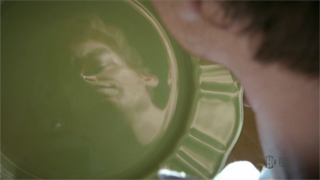Dexter: Season Five
12/22/10 06:06 PM Filed in: Life | Philosophy
I’m not sure what to make of season five of Dexter. I watched all of the episodes of the first four seasons in short order, thanks to digital versions being available on iTunes. This season I watched the episodes a week apart. Perhaps that gave me more time to reflect on each episode and consider weaknesses such as plot holes. My impression is that I had to suspend belief more this season than last and that there were more loose ends that, had they been pursued, would have lead to Dexter being caught.
And yet, I found the season finale to be quietly brilliant although perhaps not in the manner the show intended. One overarching theme was the ability of people to be transformed, something Dexter longs for. Jordan Chase transformed himself from an overweight lonely child to a fit leader with millions of followers (albeit followers seeking answers from a false prophet).
Deb changes from being a “by the book” cop with a clear sense of black and white to someone who sees more gray than before. In this scene, Dexter is starting to test Quinn’s blood stained shoes. Dexter thinks his sister is talking about Quinn, who is under suspicion for murdering a cop, but she’s really talking about herself:
 [Deb] “You think you know someone. Then it turns out you don’t. You think someone’s a good cop and then they... do something. I don’t know. All I’m saying is nothing is as simple as it seems.”
[Deb] “You think you know someone. Then it turns out you don’t. You think someone’s a good cop and then they... do something. I don’t know. All I’m saying is nothing is as simple as it seems.”
[Dexter] “You’re right about that.”
After Chase has been killed, Lumen finds that her “dark passenger” is gone. She no longer shares a passion in common with Dexter and she tells him she has to leave.
 Upon hearing this news, Dexter stares at his reflection in a plate, then throws the plate at the oven, shattering it into pieces all over the kitchen floor. It reminded me of the song “Smash the Mirror” in the rock opera “Tommy” by The Who. Smashing the mirror set Tommy free from his self-imposed prison. But Dexter remains trapped.
Upon hearing this news, Dexter stares at his reflection in a plate, then throws the plate at the oven, shattering it into pieces all over the kitchen floor. It reminded me of the song “Smash the Mirror” in the rock opera “Tommy” by The Who. Smashing the mirror set Tommy free from his self-imposed prison. But Dexter remains trapped.
The show ends with everyone, except Lumen, at Harrison’s first birthday party. Deb and Quinn have seemingly, if not overcome, at least agreed to work out their issues and appear to be a couple. Likewise, Laguerta and Batista are ready to begin their relationship anew. With signs of renewal all around him, Dexter reflects as he blows out Harrison’s birthday candle:
 Lumen said I gave her her life back. A reversal of my usual role. Well, the fact is, she gave me mine back, too. And I’m left not with what she took from me but with what she brought. Eyes that saw me, finally, for who I really am. And this certainty that nothing, nothing, is set in stone. Not even darkness. While she was here, she made me think for the briefest moment that I might even have a chance to be human. ... But wishes, of course, are for children.”
Lumen said I gave her her life back. A reversal of my usual role. Well, the fact is, she gave me mine back, too. And I’m left not with what she took from me but with what she brought. Eyes that saw me, finally, for who I really am. And this certainty that nothing, nothing, is set in stone. Not even darkness. While she was here, she made me think for the briefest moment that I might even have a chance to be human. ... But wishes, of course, are for children.”
Dexter sees transformation all around him and says that “nothing, nothing is set in stone.” And yet his despair remains. Paradoxically, even as he acknowledges the possibility of change, and sees it all around him, he extinguishes that hope for himself. He is caged by a philosophy that isn’t supported by the evidence he knows to be true.
 On a lighter, less philosophical note, someone on the Internet commented that if Dexter doesn’t learn to drive, he’s going to kill somebody.
On a lighter, less philosophical note, someone on the Internet commented that if Dexter doesn’t learn to drive, he’s going to kill somebody.
And yet, I found the season finale to be quietly brilliant although perhaps not in the manner the show intended. One overarching theme was the ability of people to be transformed, something Dexter longs for. Jordan Chase transformed himself from an overweight lonely child to a fit leader with millions of followers (albeit followers seeking answers from a false prophet).
Deb changes from being a “by the book” cop with a clear sense of black and white to someone who sees more gray than before. In this scene, Dexter is starting to test Quinn’s blood stained shoes. Dexter thinks his sister is talking about Quinn, who is under suspicion for murdering a cop, but she’s really talking about herself:

[Dexter] “You’re right about that.”
After Chase has been killed, Lumen finds that her “dark passenger” is gone. She no longer shares a passion in common with Dexter and she tells him she has to leave.

The show ends with everyone, except Lumen, at Harrison’s first birthday party. Deb and Quinn have seemingly, if not overcome, at least agreed to work out their issues and appear to be a couple. Likewise, Laguerta and Batista are ready to begin their relationship anew. With signs of renewal all around him, Dexter reflects as he blows out Harrison’s birthday candle:

Dexter sees transformation all around him and says that “nothing, nothing is set in stone.” And yet his despair remains. Paradoxically, even as he acknowledges the possibility of change, and sees it all around him, he extinguishes that hope for himself. He is caged by a philosophy that isn’t supported by the evidence he knows to be true.

blog comments powered by Disqus

